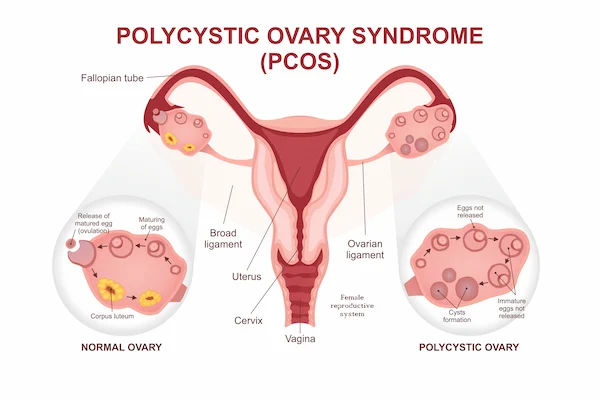Black and Thick Period Blood: Understanding Causes
Know about black and period blood, what it means, causes, when to see a doctor and how to manage during the menstrual phase.

Written by Dr. Mohammed Kamran
Reviewed by Dr. D Bhanu Prakash MBBS, AFIH, Advanced certificate in critical care medicine, Fellowship in critical care medicine
Last updated on 12th Aug, 2025

Introduction
Periods are a natural part of a woman’s reproductive health, but changes in menstrual blood color and consistency can sometimes be concerning. If you’ve noticed black and thick period blood, you may wonder whether it’s normal or a sign of an underlying issue.
In this article, we’ll help you understand:
What black and thick period blood mean?
Possible causes
When to seek medical advice?
Tips for managing menstrual health
What Does Black and Thick Period Blood Mean?
Menstrual blood can vary in color—bright red, dark red, brown, or even black. The color and texture change depending on how long the blood has been in the uterus before being expelled.
Black period blood usually indicates older blood that has taken longer to leave the uterus. It oxidizes (reacts with oxygen), turning darker.
Thick or clotted blood can be normal, especially if the flow is heavy. However, large or frequent clots may sometimes signal an issue.
Consult a top gynaecology specialist for the best advice
Common Causes of Black and Thick Period Blood
These include:
1. Slow Menstrual Flow
It is responsible for:
Blood that stays in the uterus for a longer time darkens before being shed.
Common at the beginning or end of a period when flow is lighter.
2. Hormonal Imbalances
These are seen in:
Conditions like PCOS (Polycystic Ovary Syndrome) or thyroid disorders can cause irregular periods and changes in blood texture.
Hormonal birth control (pills, IUDs) may also affect menstrual flow and color.
3. Uterine Fibroids or Polyps
Non-cancerous growths in the uterus can lead to heavier bleeding and clots, sometimes appearing dark or black.
4. Endometriosis or Adenomyosis
These conditions cause abnormal uterine tissue growth, leading to painful, heavy, or irregular periods with dark blood.
5. Miscarriage or Pregnancy-Related Changes
The changes are:
In early pregnancy, black or brown spotting may occur due to implantation bleeding or a miscarriage.
If you suspect pregnancy and notice unusual bleeding, consult a doctor.
6. Infections or STIs
Infections like pelvic inflammatory disease (PID) can cause irregular bleeding with dark discharge.
7. Perimenopause or Menopause Transition
Hormonal shifts during perimenopause can lead to irregular periods with darker, thicker blood.
When Should You See a Doctor?
While black and thick period blood is often harmless, consult a doctor if you experience:
Large clots (bigger than a quarter)
Severe pain during periods
Prolonged bleeding (more than 7 days)
Foul-smelling discharge (could indicate infection)
Irregular cycles (missing periods or frequent spotting)
If you’re concerned, you can book a consultation with a gynecologist on Apollo 24|7 for personalized advice.
Tips for Managing Menstrual Health
1. Stay Hydrated
Drinking enough water helps prevent excessive clotting and keeps blood flow smoother.
2. Maintain a Balanced Diet
Balanced diet can include:
Iron-rich foods (spinach, lentils, red meat) to prevent anemia from heavy bleeding.
Include anti-inflammatory foods (berries, turmeric, nuts) to ease cramps.
3. Exercise Regularly
Light exercises like yoga or walking can improve circulation and reduce period discomfort.
4. Track Your Cycle
Use a period-tracking app to monitor flow, color, and symptoms—helpful for doctor consultations.
5. Manage Stress
High stress can disrupt hormones—practice meditation or deep breathing to stay relaxed.
6. Avoid Excessive Caffeine & Alcohol
These can worsen bloating and cramps.
Final Thoughts
Black and thick period blood is usually nothing to worry about, especially if it happens occasionally. However, if you notice persistent changes, pain, or other unusual symptoms, it’s best to get checked by a doctor.
Consult a top gynaecology specialist for the best advice
Consult a top gynaecology specialist for the best advice

Dr. Mona Yadav
Obstetrician and Gynaecologist
19 Years • MBBS, MD (Obstetrics & Gynaecology)
Dombivli
Nulife multispeciality, Dombivli

Dr. Parul Sharma
Obstetrician and Gynaecologist
8 Years • MBBS, MS (Obstetrics & Gynaecology)
New Delhi
THE DOCTORS NESST, New Delhi
Dr. K Anusha
Obstetrician and Gynaecologist
4 Years • MBBS, DGO
Yemmiganur
SRINIVASAA HOSPITAL, Yemmiganur

Dr. Asha Rani Singh
Obstetrician and Gynaecologist
24 Years • MBBS DGO
Delhi
Dr Asha Rani Singh Clinic, Delhi

Dr. Shyamala Devi
Obstetrician and Gynaecologist
38 Years • MBBS, MS Obstetrics & Gynaecology
Vijayawada
Sri Shivshakti Nilayam, Vijayawada



